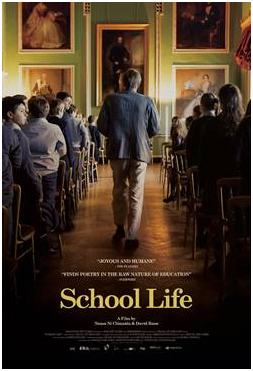Primary Times - the definitive what’s on and where to go family guide of activities and events for children of primary school age. Things to do with your kids during the school holidays including arts and craft activities, music and theatre for children, parties, competitions, days out, and family attractions along with term time drama schools, dance classes, after school clubs and sports activities. Things to do at a place near you!
School Life – Q&A with director Neasa Ní Chianáin and co-director & producer David Rane
 School Life follows a year in the life of John and Amanda Leyden, two passionate teachers at Headfort School, the only primary-age boarding school in Ireland. Headfort School. You can find our review of this remarkable and touching documentary here. Primary Times was lucky enough to get the chance to speak with director Neasa Ní Chianáin and co-director & producer David Rane about this absolutely fascinating movie.
School Life follows a year in the life of John and Amanda Leyden, two passionate teachers at Headfort School, the only primary-age boarding school in Ireland. Headfort School. You can find our review of this remarkable and touching documentary here. Primary Times was lucky enough to get the chance to speak with director Neasa Ní Chianáin and co-director & producer David Rane about this absolutely fascinating movie.
Q. How did you find out about John and Amanda? Was the film based around them to begin with?
A. We really only discovered John and Amanda once we decided to make the film about the school. During our initial research John and Amanda were giving us a wide berth. They really didn’t like the idea of a film being made about the school. While researching, we met with many alumni, 50-year olds, 40-year olds etc and we asked them about their experience in the school. It was John and Amanda Leyden’s names that kept coming up in the alumni’s reminiscences on their school days. The Leydens were the ones who had left their mark on the children. The current Headmaster, Dermot Dix, also strongly suggested we get to know the Leydens. So, we knew that it was essential to get them on board, but it did take the guts of a year for that door to open. It took time to get to know them and for them to get to know us. Once they decided to participate in the film, they were incredibly generous and wholly allowed us into their lives.
Q. When you began filming did you have an idea of the themes you wanted to explore, or did they make themselves apparent as the year went on. If you had some set ideas, did you have to change the narrative you wanted to follow at all?
A. Both David and I had one burning question, could a school become a surrogate family, looking after the ‘whole child’? Many schools pitch themselves as this, but we found that Headfort really delivered. This was the primary focus of our film and I think we got our answer, and put it on screen.
Q. When you’re first introduced to the school and its inhabitants, for a moment it feels as if this might be a film that many people would find difficult to relate to. Was that a particular worry?
A. If you’re referring to the boarding school aspect, yes we did wonder about this. Both David and I had been to boarding school, so it wasn’t an alien phenomenon to us. But we knew this was not the norm in many cultures. When we told people what film we were working on, we tended to get extreme reactions, either outright horror at the very idea of sending your child away to boarding school, or some people revealing that it had been a childhood fantasy of theirs, to go to boarding school. Ultimately, we feel that the film is about a particular kind of childhood, a childhood that not everybody would deem acceptable, but we believe everyone can related to the idea of a childhood that gives one the freedom to discover who they are and everyone can relate to the impact of an inspiring and influential teacher.
Q. The documentary style you use is very hands-off. There’s no direct interviews to camera. How involved were you as filmmakers in directing what happened and what was spoken about?
A. David and I are fans of observational filmmaking. We always aspire to telling stories by not using interviews and not using voiceovers or ‘signposts’. We want the audience to experience a world, not be told about it. We never gave any direction to our characters. We filmed events as they unfolded. This required a huge amount of time on our part, but because we mostly filmed it ourselves, we had time on our side and we completely immersed ourselves in the Headfort world. We had a room in the school that we could retreat to whenever we weren’t filming. So we were on site most days. We tried to keep ourselves as informed as possible about what was going on in the school, and sometimes we did miss things, but there was always the potential of something else happening that would make up for a missing event, once we were prepared to wait.
Q. How was John to deal with? He comes across as quite a no-messing, sharp and witty man in the film. Were you ever on the receiving end of a witty put-down or two? Did Amanda have to console you afterwards? Their teaching styles are very different, but both seem to get results.
A. John was incredibly generous with us. Yes of course he slagged us like he does with everyone, but it’s never meant to hurt, it’s always done with a sense of fun or cleverness. Sometimes his references went over our heads (as they often do with some of the children) and David and I would puzzle over certain remarks…but if you asked for clarification, he always gave it and it was always witty.
Q. As the film continues it becomes clear that one of the key themes is the dedication and hard work of teachers. So although the film is set in a particular school, there are presumably, stories like this all over the country. Have you had any feedback from teachers, pupils about the film or anecdotes? When I was watching it, it instantly made me think of a couple of my old teachers who had gruff exteriors but hearts of gold.
A. Absolutely. Teachers all over the world have come to see this film and many have come up to us privately or spoken out in Q&As. Mostly they talk about how inspired they’ve been by John & Amanda’s approach to teaching. Some have lamented the lack of time and freedom they have within their own teaching environment to be able to reach the children in a similar fashion. Some have said that they try to deliver as much as they are allowed within the confines of whatever state system they are operating in…but ultimately, I think teachers see things in the film that have sadly disappeared from today’s teaching pedagogies.
Q. The backgrounds of the pupils and staff are never really made explicit, so everything we know about Amanda and John or Ted and Eliza comes from observing them and from small hints from the dialogue. Was leaving backstory out of the film a deliberate move and if so, why?
A. Yes, it was. This was a film about a particular type of teaching and creating a space and freedom for children to discover themselves and their full potentials. We weren’t interested in the children’s backgrounds, to us they were just children at this age with a variety of hurdles and issues they had to deal with, like any other children. We were interested in what this type of childhood gave them. Does it matter where Ted came from, if his Dad was a postman a doctor, or a farmer? I think not, not in this particular story.
Q. The final moments of the film are interesting – whilst the children are celebrating the end of the year and their time at the school with staff and parents, John and Amanda seem quite distant from the emotion of it all. There’s a sense that this is just another part of the educational process. The result is a conclusion that isn’t overly emotional, like say, Dead Poet’s Society. It’s very matter of fact. Was that what you were expecting and hoping for?
A. John and Amanda have had 46 years of these goodbyes. I don’t think they were distant from it all, I think they were saying goodbye, but weren’t going to linger…it was the children’s final rite of passage, a farewell to childhood. Secondary school and the next phase of development is a whole other ball game. Many of those children will stay in touch with John and Amanda, many will, to quote John ‘haunt Facebook’ for a few months and John will respond and be there for them. Every one of those children will be welcomed back to the school should they so desire. That’s what Olivia (the gap student in the band room) represented: the hundreds of returning children who come back as students or adults, some for a day, some for a week, and in Olive’s case, two whole terms. Every alumnus is different but the school and John and Amanda will always see them as part of the Headfort family. We found this quite extraordinary.
Q. Why did you change the name of the film?
A. Our Distributor Magnolia changed the name. I guess they were afraid people would think ‘In Loco Parentis’, the original title, was a foreign film with subtitles, which might deter people from coming to see it in a cinema. Our own 10-year-old son was afraid people would think it was called ‘Crazy Parents’ because of the Spanish connection, and a possible mistranslation of the word ‘loco’. The title, School Life, is more direct and is ‘what it says on the tin’ without any obfuscation.
Q. I suppose what everyone wants to know is what happened to everyone? Did John and Amanda retire? And how did Eliza and Ted get on? Will you ever be tempted to revisit them?
A. John and Amanda are still teaching at Headfort, they will possibly never retire, and I don’t think John can. We see them regularly, I hope they will be friends for life, we feel very privileged to know them. Eliza is doing really well in secondary school, she’s gone back to being a day pupil because her new school is closer to her home, and she continues to add to her circle of friends. And Ted, much to everyone’s relief, loves his new school, St David’s in Wales. He’s really taken to drama and is involved in all the school plays there. He says his new school is just as much fun as Headfort. I am not sure if we will ever revisit our characters in a later film – it was such a pleasure to spend the time we did with them.
SCHOOL LIFE is in cinemas now and at Picturehouse Cinemas nationwide 14th November www.schoollife.ie
Read the Primary Times Film review here



